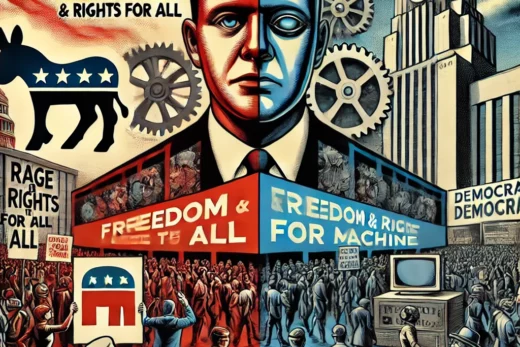
Examining how a hypothetical societal collapse due to the widespread adoption of the “Woke Mind Virus” might mirror our current timeline can be insightful. Here are some parallels and situations that reflect these potential effects:
Current Education and Workforce Trends
STEM Education and Workforce Shortages:
- Decline in STEM Enrollment: Concerns about declining enrollment in STEM fields are evident in many Western countries. For example, the National Science Board reported that while the number of STEM degrees awarded in the U.S. has increased, the proportion of students choosing these fields compared to other countries remains a concern .
- Workforce Shortages: The healthcare industry is already experiencing significant workforce shortages. The Association of American Medical Colleges projects a shortfall of up to 139,000 physicians by 2033 . Similarly, the engineering sector faces a shortage of skilled workers, impacting infrastructure projects and maintenance.
Infrastructure Challenges
Deteriorating Infrastructure:
- American Society of Civil Engineers (ASCE) Report: The 2021 ASCE Infrastructure Report Card gave the U.S. infrastructure an overall grade of C-, highlighting issues such as aging bridges, deteriorating roads, and outdated water systems . These problems reflect the potential future where a lack of STEM focus could lead to further deterioration.
- Sanitation and Water Issues: Flint, Michigan’s water crisis is a prominent example of the dire consequences of neglected infrastructure and poor management. The crisis led to widespread lead contamination and long-term health issues for residents .
Technological and Healthcare Developments
Slowing Technological Advancements:
- Innovation Slowdown: While technology continues to advance, there are concerns about the pace of innovation slowing down in some sectors. For instance, Moore’s Law, which predicts the doubling of transistors on a microchip every two years, has shown signs of slowing .
- Healthcare Advancements: The COVID-19 pandemic underscored the importance of rapid medical innovation. However, ongoing challenges such as vaccine hesitancy and uneven healthcare access highlight vulnerabilities in the system that could worsen without sufficient STEM investment.
Social and Political Unrest
Rising Political Polarization:
- Political Polarization: The U.S. and other countries are experiencing significant political polarization, which affects the implementation of policies and creates social unrest. This polarization is often exacerbated by social media and echo chambers.
- Cancel Culture: The phenomenon of cancel culture reflects societal efforts to hold individuals and organizations accountable for their actions but can also lead to divisiveness and fear of open dialogue.
Comparisons and Reflections
- Echo Chambers and Social Media Influence: The impact of social media in creating echo chambers and spreading misinformation is well-documented. Platforms like Facebook and Twitter have been criticized for their role in polarizing public opinion and spreading false information .
- Economic Disparities and Social Justice Movements: Movements like Black Lives Matter highlight ongoing social justice issues and the public’s demand for systemic change. However, these movements also face backlash and resistance, illustrating the tension between progress and traditional values .
Conclusion
While the hypothetical scenario of a global “Woke Mind Virus” might be extreme, examining current trends reveals real parallels in education, workforce shortages, infrastructure challenges, and social-political dynamics. Addressing these issues requires a balanced approach that values both social justice and the critical importance of STEM education and technological innovation.
Sources:
- National Science Board: Science and Engineering Indicators 2020
- AAMC Physician Workforce Projections
- ASCE 2021 Infrastructure Report Card
- The Flint Water Crisis: A Public Health Disaster
- IEEE Spectrum: Moore’s Law Is Slowing Down
- WHO on COVID-19 Vaccination Challenges
- Pew Research Center on STEM Education
- Pew Research Center on Political Polarization
- The New York Times on Cancel Culture
- The Atlantic on Social Media and Echo Chambers
- BBC on Social Media Misinformation



